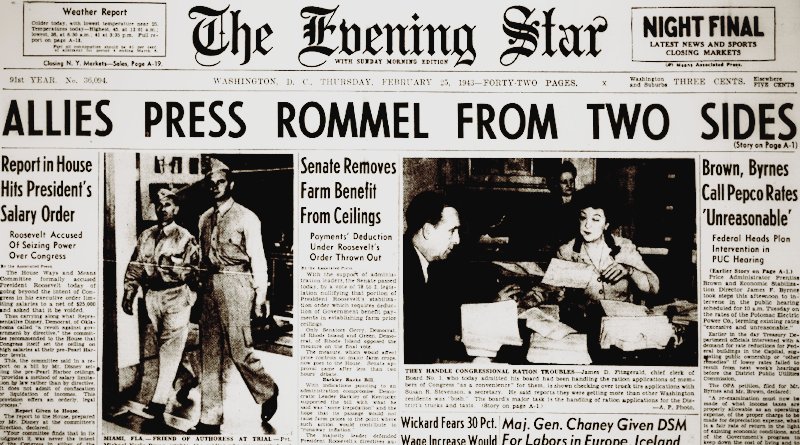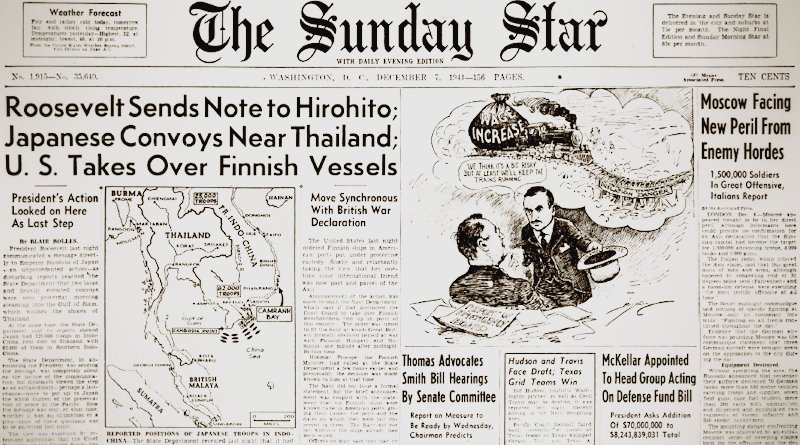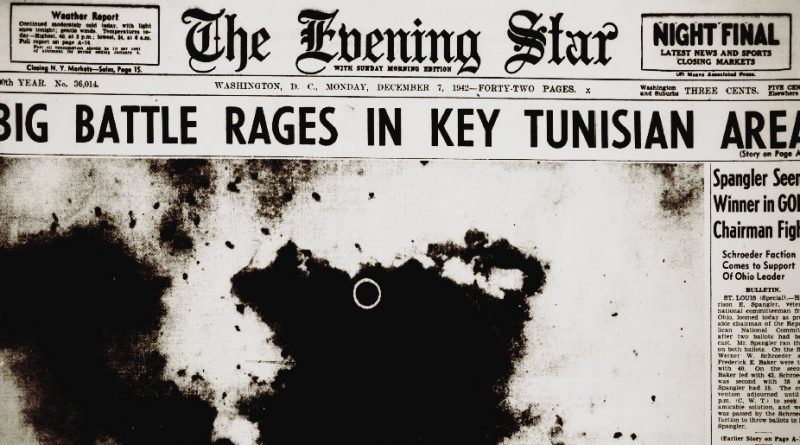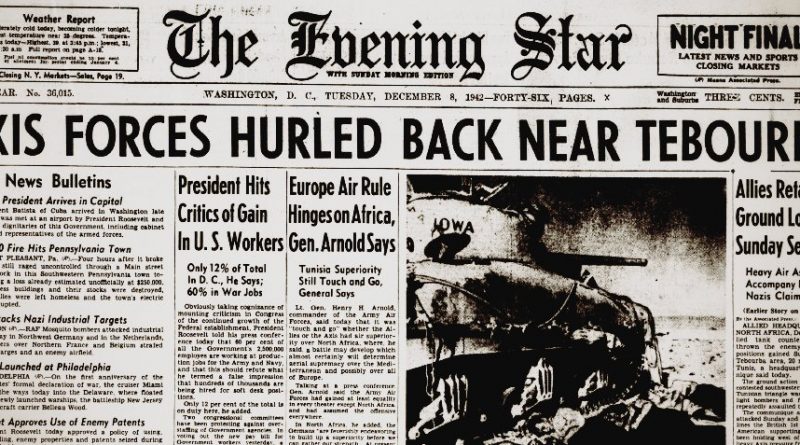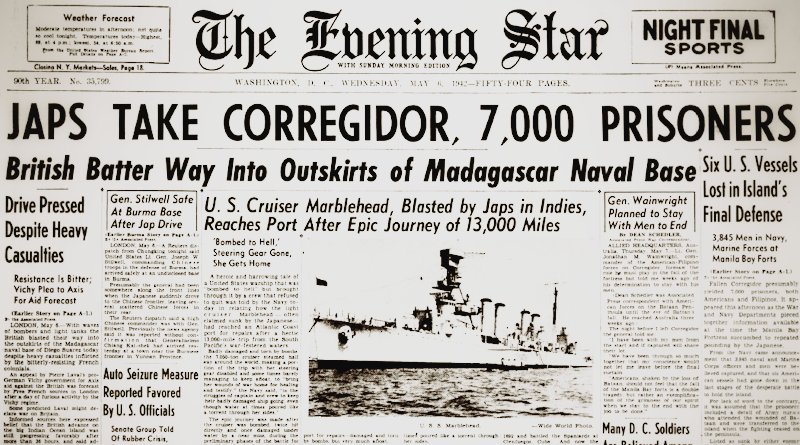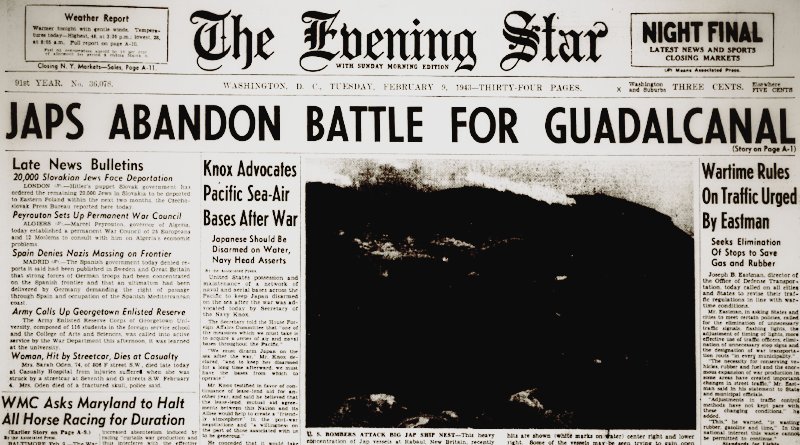World War II Chronicle: February 25, 1943
Click here for TODAY’S NEWSPAPER
The U.S. Navy has captured and repaired a Japanese Mitsubishi Zero fighter that had been shot down in the Aleutians and have flown it across the United States. It is now being tested at Anacostia Naval Air Station (story on page four)… Sports section begins on page 19 which features a column by Grantland Rice.
Roving Reporter by Ernie Pyle
THE TUNISIAN FRONT — (By Wireless) — Little cameos of war:
Most of the preliminary battles between Axis and American troops have been for possession of mountain passes leading to eastern Tunisia. In one of these battles our men had worked their way up to the mouth of a pass on one side and the Italians had done the same on the other side.
There they lay, well dug in, not more than 200 yards apart. They were separated by previously laid mine fields over which neither dared to pass. So they just lay there, each side waiting for some action from the other.
The Italians began sending over notes to the Americans. I’ve heard many stories of such happenings in the last war, but it is rare in this one.
The Italians would send over a note telling the Americans they were badly outnumbered and didn’t have a chance and had better surrender right now. The Americans would send back a note saying, “Go to hell, you lousy spaghetti-eaters. We’ll tear your ears off before this is over.”
The reason I’m telling this story is that these notes, with perfect incongruousness, were carried back and forth through the mine fields by a small Arab boy who happened to wander past and took on the job for a few francs!
The other day we drove past a big bivouack of supply trucks on the desert a few minutes after some German planes had dive-bombed and strafed them. The soldiers all took to foxholes and nobody was hurt, but three trucks were set afire. The soldiers got two fires out immediately, but a third was hopeless, for it was a big truck loaded with scores of five-gallon tins of gasoline. These would explode and scatter flaming debris.
Then suddenly there was a bigger explosion and one lone gasoline tin went shooting straight up into the air all by itself. That can rose majestically to a height of about 400 feet, gradually slowed down until it seemed to pause motionless for a moment in the sky, then came plunging straight down. Its explosive flight had been so straight up and down that when it fell it grazed the side of the truck not five feet from where it had started.
Some little thing like that — the uncanny straightness of a tin can’s war journey — often stays in your mind for ages after the memory of horror or bravery has dimmed and passed.
Another time Don Coe of the United Press and I stayed all night at a general’s forward command post a few miles back from a pass where fighting was going on.
We were in a big farmyard. Trucks and jeeps were parked around the edge of the lot under trees. We picked out a vacant spot and threw our bedrolls on the ground. We rolled a jeep in front of us to keep trucks from running over us in the blackout while we slept.
There is something good about sleeping outdoors. For a long time we lay back, rolled tight in our blankets, looking straight up into the sky. There were millions of stars, and every few seconds one of them would fall. A couple of times stars went shooting horizontally across the heavens. The sky at night is a majestic and inspiring thing, yet we have come to far-off Africa and sleep on the ground in order to see and feel it.
After a while we went to sleep. The next thing I knew a gruff voice was saying:“What the hell is this jeep doing out here in the open like this?”
I peeked one eye out and saw that it was just daylight and that the voice was no less than that of the general, out on an early-morning inspection prowl. Whereupon I shut my eyes quickly and let Don handle the situation.
The general made a few more choice remarks before Don got his sleepy head out of the blankets. Then all of a sudden the general said:
“Oh, I’m sorry. I didn’t realize it was you. Forget it. Everything’s all right.”
I lay very still, pretending to be asleep, and chuckling to myself. Later in the day the general apologized to me, too, but I was sorry he did and told him so, for we had done something very thoughtless which endangered other people as well as ourselves. And the fact that we were correspondents instead of soldiers didn’t excuse us.
But at least we learned our lesson. We won’t leave jeeps showing after daylight again.
I have already written a great deal about the cold. You can sympathize there, for you all know what it feels like to be cold. But you don’t know — can never know, without experiencing it — the awful feeling of being shot at by speeding enemy planes.
If our soldiers are meticulous about any one thing it is about watching the sky. Nobody has to tell them to be cautious. After just one attack, caution becomes a sort of reflex action. You never let a plane pass without giving it a good look over. The sound of a motor in the sky is a sign to stop whatever you are doing long enough to make sure.
Of course aerial attack is at its worst in actual battle, when Stukas are diving on our troops. That is a nightmare. But it’s not only in battle that they get it. They get it also in bivouacks and on the roads. They are subject to it all the time — not in great or blanket amounts, to be sure, but the danger is always there, like a snake hidden somewhere along your path.
As a result, camouflage becomes second nature to you. Near the front you never park a jeep without putting it under a tree. If there are no trees you leave it on the shady side of a building or wall. If there is no cover at all you throw your camouflage net over it.
As you near the front you fold your windshield down over the hood and slip a canvas cover over it so it won’t glint and attract a German pilot’s eye.
German pilots like to sneak up on you from behind, and you wouldn’t believe how difficult it is to spot a hostile plane.Some Army friends of mine the other day never knew there was a plane within miles until one swooped overhead and 20-millimeter shell splattered on all sides of them.
Every day somebody gets strafed on the roads over here, yet it is really the tiniest fraction of a per cent of our men that ever see a German plane when on a trip.I had driven hundreds of miles over these Central Tunisian roads in convoy but have seen only two strafings and they occurred far up the road.
It’s the stealthiness of the thing, the knowledge that this sudden peril is always possible, that gets you. There are thousands of Americans over here who are calm under ground fire but hate strafing planes. Soldiers in camp lose no time in hitting their slit trench and soldiers on the road flow out of their vehicles like water every time a plane is seen. Nine times out of ten it turns out to be one of our planes, but if you waited to make sure you might be too late. More than once I’ve quickly slowed down and then realized the approaching plane was only a soaring bird.
As you drive along roads in the frontal area you meet hundreds of vehicles, from jeeps to great wrecker trucks, and every one of the hundreds of soldiers in them will be scanning the sky as though they were lookouts on a ship at sea.
The other day a friend and I were coming back from the front lines in our jeep and met a great convoy of supply trucks making a suffocating cloud of dust. Our first intimation of danger was the sound of ack-ack shells exploding in the sky behind us. We stopped in nothing flat, and piled out. I remember looking back and saying:
“There’s two dozen of them coming right at us!”
We ran out across the fields about 50 yards to a small ditch, and stopped there to look again. My two dozen enemy planes were actually just the black puffs of our ack-ack shells. We couldn’t see the planes at all. That shows you how deceptive your senses are when you get excited.
You learn to hate absolutely flat country where there are no ditches to jump into or humps to hide behind. We even make jokes about carrying collapsible fox holes for such country.
In camp I’ve seen soldiers sit in their slit trenches, completely oblivious of the presence of anyone around them, and cuss the German planes and root for our ack-ack to get one, just as though they were at a football game.
The commandant of one outfit withch has been at the front two months told me they had been strafed and dive-bombed so much they couldn’t hear a motor any more without jumping.
I know one American outfit that has been attacked by Stukas 23 times in one day. A little of that stuff goes a long way.
If we have ack-ack to shoot back it lessens the soldiers’ fear greatly, and if our own fighters are in the sky then the men feel almost no uneasiness at all.
Yes, the cold and the Stukas are the bugaboos of the average guy over here. Before long now the cold will disappear, and we all hope the Stukas will take the hint also.
Evening star. (Washington, D.C.), 25 February 1943. Chronicling America: Historic American Newspapers. Lib. of Congress.
https://chroniclingamerica.loc.gov/lccn/sn83045462/1943-02-25/ed-1/
